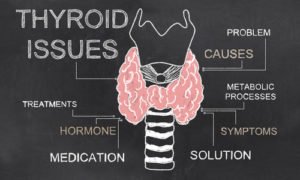
The thyroid produces hormones that play a critical role in regulating our body’s metabolism, fertility, growth, nervous system, and other functions that directly determine our health and quality of life. When a thyroid fails to function properly, especially when it is underactive, serious health effects can occur.
One of the common, evidence-based approaches to treating an underactive thyroid (known as hypothyroidism) is thyroid hormone replacement therapy.
The Benefits of Thyroid Hormone Replacement Therapy
Hypothyroidism affects virtually all aspects of a person’s health. Some of the more immediate, obvious effects of an underactive thyroid gland include:
- Aching muscles
- Gaining weight
- Lack of energy
- Thinning hair
- Abnormal cold sensitivity
- Thin blood
- Depression
Thyroid hormone replacement therapy is an option for many with an underactive thyroid, but before electing for such therapy, you may want to know, what is the best medicine for thyroid dysfunction? It is wise to have a basic understanding of what the thyroid gland does and how thyroid hormone replacement therapy can help restore its normal function.
For a free consultation, call (305) 682-1818
Your Health and Your Thyroid Gland
The thyroid gland is located in the front of the neck near the voice box, and its primary function is to produce and secrete hormones that regulate several aspects of our health. The primary hormones that the thyroid gland produces are:
- Tetraiodothyronine, (T4)
- Calcitonin
- Triiodothyronine, (T3)
Each of these hormones is important, as hormones directly regulate several facets of human health. Different hormones are responsible for essential biological functions like fertility, growth, metabolism, and neurological responses. For example, the T3 and T4 hormones produced by the thyroid gland stimulate:
- A faster heartbeat and pulse
- A rise in body temperature
- An alert nervous system, which heightens reflexes and concentration
- Physical body growth
- Maturation in the brain
The importance of each of these processes cannot be overstated, and without a well-functioning thyroid gland, none of them would be possible. When considering what is the best medicine for thyroid treatment, an understanding of how your body works is essential.
Signs of an Unhealthy Thyroid Gland
In order to stress the importance and value of thyroid hormone replacement therapy, one must first consider what happens in the body when a thyroid gland becomes underactive.
The symptoms of hypothyroidism include:
- In the elderly, additional problems may arise affecting memory and possible depression
- Weak and aching muscles
- Low energy
- Muscle cramping
- The inability to move quickly
- A minimized or lost sex drive (libido)
- Dry, scaly skin
- Sensitivity to cold
- Constipation
- Abnormal weight gain
- Unhealthy hair and nails
- Numbness, tingling, and pain in the extremities
- Irregular or heavy menstrual flow
The effects of hypothyroidism get worse with time. In addition to the worsening of the above symptoms, additional health effects may emerge in those who ignore or fail to treat the problem affecting their thyroid. Some of these effects may include:
- A slowed heart rate, which may be a sign of a taxed cardiovascular system
- Anemia, which is an abnormally low amount of red blood cells
- Diminished hearing or complete hearing loss
- A puffy face
- A hoarse or low-pitched voice
Those who recognize a possible issue with their thyroid should take the next step of seeing a medical professional who can help them get to the root of the issue.
Possible Causes of an Underactive Thyroid
Like most ailments, hypothyroidism can be the result of a number of things that can have an impact on what is the best medicine for thyroid dysfunction treatment. Some of the possible causes of an underactive thyroid include:
Thyroid Surgery
Thyroid surgery can be a life-saving procedure for those with cancer of the neck, throat, or head, or anybody else whose overall health is threatened by a part of their thyroid gland. However, hypothyroidism can be an unfortunate side effect of removing part of the thyroid gland.
Autoimmune Disease
Some diseases use the body’s immune system against itself. These are known as autoimmune diseases, and the thyroid gland is not immune to their adverse health effects.
Radiation Therapy
Radiation is another possible life-saving treatment for those with cancer, and when the radiation is focused on the neck, throat, or head, the thyroid can be irreparably impacted. If you have had radiation therapy and are experiencing symptoms of hypothyroidism, then radiation therapy may be the cause.
Adverse Reaction to Medication
We all know that most medications cure one thing but have the possibility of inducing new health issues that we did not have before. Some medications can create side effects such as hypothyroidism, so if you have started a new medication and begin experiencing the symptoms of hypothyroidism, the medication itself may be the cause.
An Overcorrected Hyperthyroidism Treatment
Treatment sometimes poses the possibility of going too far—call it an overcorrection, if you will. Some treatments for an overactive thyroid gland, called hyperthyroidism, can actually result in an overly sluggish thyroid gland that qualifies as hypothyroidism.
A medical professional can help you pinpoint the root of your hypothyroidism, and the cause of your underactive thyroid gland will help inform the best course of treatment.
Click to contact our specialist today
Consider Thyroid Hormone Replacement Therapy
Thyroid hormone replacement therapy is a viable option for many who are experiencing sluggishness, weight gain, headaches, and other symptoms indicative of an underworking thyroid gland. Along with diet and lifestyle changes, such therapy can reduce or even reverse the effects of abnormal thyroid function.
Bringing You Back to Normal
Thyroxine (T4) is the hormone responsible for much of our normal metabolic function, from how quickly we digest food to our neurological responses to threats. Thyroid hormone replacement therapy aims to restore normal levels of the T4 hormone by introducing a synthetic version of the hormone into the body.
A medical professional will begin by taking blood tests to determine the amount of T3 and T4 hormones, along with the thyroid-stimulating hormone (TSH) in your bloodstream. The results of these tests will directly impact the dosage of synthetic hormone that you will be prescribed.
Once you have a personalized dosage, you will receive a regiment for taking your thyroid hormone replacement pills. Following this regimen and implementing the additional dietary and lifestyle advice may help you experience a boost in energy and other metabolic processes that are compromised by lagging thyroid function.
Complete a Free Consultation form now
Call the HealthGAINS Team Today
The team at HealthGAINS employs a personal approach to each patient with an underactive thyroid. We will answer any questions you have and ensure that you understand each step in the process that is thyroid hormone replacement therapy. Call us today at (305) 912-8828 to discuss how this therapy could benefit you.
Call or text (305) 682-1818 or complete a Free Consultation Form








